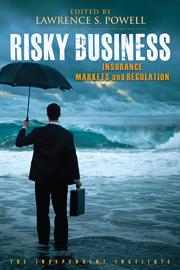U.S. Rep. Frederica Wilson, D-Florida, recently introduced the Homeowners’ Defense Act of 2013, which would create a semi-private federal pooling mechanism to help states deal with large-scale natural disasters. Florida and California in theory would be the biggest potential beneficiaries, but Californians have good reason to be skeptical.
Wilson’s proposal can’t work and could further damage California’s already unstable finances. Here’s why. She assumes the federal government can somehow pool risk better than the private sector, and that simply isn’t true.
Currently, private insurance and reinsurance companies help the California Earthquake Authority spread its risk all around the world. For example, through global markets, the risk of a catastrophic earthquake hitting the Bay Area might be pooled with the risk of industrial accidents in Brazil and cyclones in Australia.
Since these events will hardly ever happen simultaneously, insurers can earn a return on one type of risk as they pay out claims on another.
To break even, a government program that consolidates catastrophe risk here in the United States would either have to charge more than the private sector currently charges or, more likely given the nature of politics, undercharge for what it sells, leaving taxpayers holding the bag.
This is what the National Flood Insurance Program has done. Offering “coverage for as low as $129 per year,” the program, despite promises to break even, owes the Treasury about $30 billion — with no practical way to pay back the money.
That’s where the potential harm to California comes in.
The California Earthquake Authority is one of the few major state agencies with solid finances. If a major earthquake hit, everybody who owns an earthquake authority policy would get paid.
By contrast, Florida’s Hurricane Catastrophe Fund isn’t in good shape. Its own management concedes that it couldn’t pay the bills after a truly major storm—largely because it doesn’t transfer risk to the private sector.
If the California Earthquake Authority is tied to Florida’s hurricane fund through federal risk pooling, the authority and California’s taxpayers could end up paying substantial costs for a hurricane in Florida.
The idea could theoretically work if Florida’s fund were run on the same principles as California’s. But it’s not. Rather than transferring risk to the private market, it relies on its supposed ability to impose special taxes to cover major losses.
And it could get worse. As more states join, California taxpayers could end up on the hook for other natural disasters as well, ranging from a volcanic eruption in Washington to a tornado in Tennessee.
Wilson’s bill might theoretically benefit her constituents in Florida, but it’s a bad deal for California taxpayers, already the most burdened in the nation. Congress has good grounds to reject the measure, and California representatives should not sign on to similar legislation.








